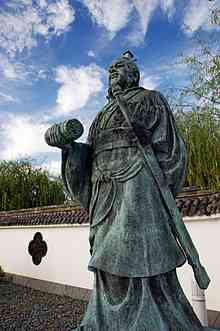Sun Tzu (/ˌsuːnˈdzuː/;[2] also rendered as Sun Zi 孫子) was a Chinese general, military strategist, and philosopher who lived in theEastern Zhou period of ancient China. Sun Tzu is traditionally credited as the author ofThe Art of War, a widely influential work ofmilitary strategy that has affected both Western and Eastern philosophy. Aside from his legacy as the author of The Art of War, Sun Tzu is revered in Chinese and the Culture of Asia as a legendary historical figure. His birth name was Sun Wu, and he was known outside of his family by his courtesy name Changqing. The name Sun Tzu by which he is best known in the West is an honorific which means "Master Sun".
Sun Tzu's historicity is uncertain. Sima Qianand other traditional historians placed him as a minister to King Helü of Wu and dated his lifetime to 544–496 BC. Modern scholars accepting his historicity nonetheless place the existing text of The Art of War in the laterWarring States period based upon its style of composition and its descriptions of warfare.[3]Traditional accounts state that the general's descendant Sun Bin also wrote a treatise on military tactics, also titled The Art of War. Since both Sun Wu and Sun Bin were referred to as Sun Tzu in classical Chinese texts, some historians believed them identical prior to the rediscovery of Sun Bin's treatise in 1972.
Sun Tzu's work has been praised and employed throughout East Asia since its composition. During the twentieth century,The Art of War grew in popularity and saw practical use in Western society as well. It continues to influence many competitive endeavors in Asia, Europe, and Americasincluding culture, politics,[4][5] business,[6] and sports,[7] as well as modern warfare.















0 comments:
Post a Comment